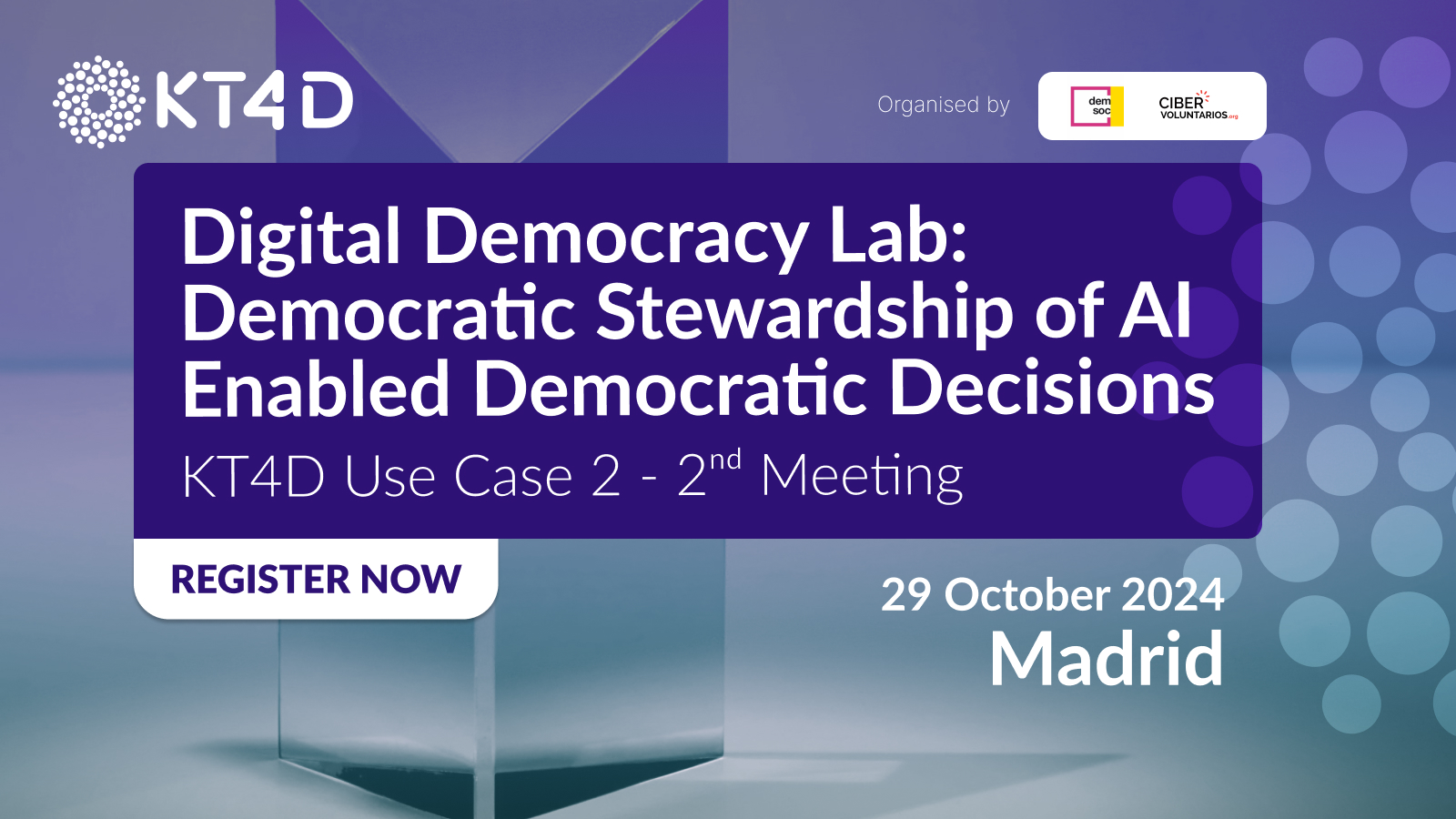Digital Democracy Lab: Democratic Stewardship of AI Enabled Democratic Decisions KT4D Use Case 2 - 2nd Meeting

KT4D partners, The Democratic Society and Cibervoluntarios, are co-organising the Digital Democracy Lab: Democratic Stewardship of AI Enabled Democratic Decisions KT4D Use Case 2 - 2nd Meeting, that will be held on 29 October in Madrid.
Event Background
The event is part of the KT4D project, which investigates how democracy and civic participation can be safeguarded and fostered in the face of rapidly changing knowledge technologies, such as AI. As part of the research project, this is the second of three meetings focused on exploring citizens' perceptions of knowledge technologies and the development of educational materials and games to enhance digital literacy.
This citizen-facing workshop in Madrid is being executed in parallel with the Warsaw Use Case (UC3) meeting to accommodate the influence of local contexts, like norms, languages and societal expectations, on democracy and civic participation.
This concrete and customised experience will give us a sense of the extent to which attitudes and effective measures toward the safeguarding of democracy in the face of AI and big data are reliant upon culturally specific linguistic and contextual signals.
Target audience & objectives
The priority audience segments for this workshop are citizens and CSOs.
The objectives of the workshop are:
- Develop critical digital literacy: Enhance participants' understanding of AI systems used in democratic deliberation and policy-making contexts, including exploring the "metabolism" of the Digital Democracy Demonstrator and AI systems more generally.
- Practice democratic stewardship: Provide hands-on experience in generating, reviewing, and revising AI-produced materials, demonstrating the concept of democracy-in-the-loop and democratic stewardship of technology.
- Evaluate AI in democracy: Encourage reflection on the trustworthiness, legitimacy, and potential impacts of using AI in democratic and policy-making processes, including discussion of risks, benefits, and ethical considerations.
- Identify improvements and implications: Explore potential enhancements, limitations, and broader implications of AI-enabled democratic deliberation and policy creation processes.
- Gather insights for future development: Collect participant feedback on their experience with the AI system and overall process to inform future iterations of the Digital Democracy Lab and contribute to the broader KT4D project.
Why you should attend
The Digital Democracy Lab offers you a hands-on opportunity to explore the intersection of AI and democratic decision-making. In this 5-hour workshop (including a 1-hour lunch), you'll:
- Develop critical digital literacy by examining the inner-workings and design decisions of AI systems, generally, and AI systems used in democratic deliberation and policy-making, more specifically.
- Gain practical experience in democratic stewardship of technology by generating, reviewing, and revising AI-produced policy briefs.
- Evaluate the trustworthiness and legitimacy of AI in democratic processes through direct interaction with a specialised AI system.
- Contribute to improving AI-enabled democratic deliberation by providing feedback on your experience and identifying potential enhancements.
- Engage in meaningful discussions about the ethical considerations, risks, and benefits of integrating AI into policy-making.
- Enhance your ability to participate in future public debates on AI governance by understanding both its potential and limitations.
By participating, you'll play an active role in shaping how AI could be responsibly integrated into democratic processes - and how democratic stewardship can be integrated into new technologies - ensuring that future implementations align with citizens' values and expectations.
Coffee and light lunch will be provided at the event!